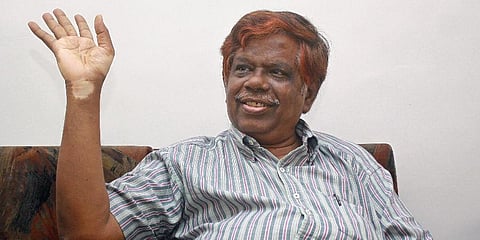Guv reasoning wrong: ex-judge Chandru
CHENNAI: Retired Judge of Madras High Court K Chandru, who headed the committee formed by the state government to advise on enacting fresh legislation to ban online gambling, said on Thursday that Governor RN Ravi’s reasoning that the Tamil Nadu Assembly lacked legislative competence to enact legislation to ban online gambling is wrong as per the Constitution. He said the state government need not give any further clarifications on this issue and just pass the Bill again and send it to the Governor for his assent.
In a telephonic interview, Justice Chandru shared his views on the points raised by the governor and whether there is an ulterior motive behind the governor’s denial of assent.
What is your view on the Governor declining his assent to the Bill to ban online gambling?
It is not correct as per the Constitution. The governor said the state legislature has no competence to enact such legislation. But any criminal offence comes under the state’s jurisdiction and hence the state can make law on any criminal offence. Running online gambling is a criminal offence because they are cheating people and they are manipulating the results.
The report submitted by the committee headed by me to the government has already clarified the questions raised by the governor. The governor said the online gambling could be regulated like in the United States of America. But the committee has found that it cannot be regulated and should be banned. The Governor also said online gambling is a game of skill. A game of skill will have someone who is playing against you. But here, you are playing with a machine and the formula and algorithms are set by someone and the result can be manipulated.
Do you suspect any ulterior motive for the denial of assent by the Governor sir?
Yes, there could be, because of the Governors of Kerala, Telangana, Tamil Nadu and Punjab are working in tandem on three areas - delaying assent to the Bills adopted by the state assemblies, laws dealing with universities, and exhorting the public directly against the stand of the government in power. So, there is a pattern in the functioning of these Governors.
What should be the next move of the state government on this issue?
The government should pass the Bill again in the state Assembly at the earliest and send it to the Governor for his assent. Under Article 200 of the Constitution, the Governor is bound to clear the Bill.
Does the government need to clarify further about the Bill to the Governor?
The government need not clarify further any of the points raised by the Governor since the concerns of all stakeholders have been taken into account already by the government. The Bill was passed only after holding a public consultation. As such, the government need not produce another certificate from legal experts about the competence of the Bill to the Governor.
What if the Bill is challenged again in court?
Anyone can move the court even after the Bill becomes legislation. That is a different issue. In many cases, Bills given assent are being challenged before the court. Whether the law is competent or not should be decided by the High Court or the Supreme Court. The Governor cannot decide that. But the present Bill has been enacted after taking into account all aspects and it is legally sound.

